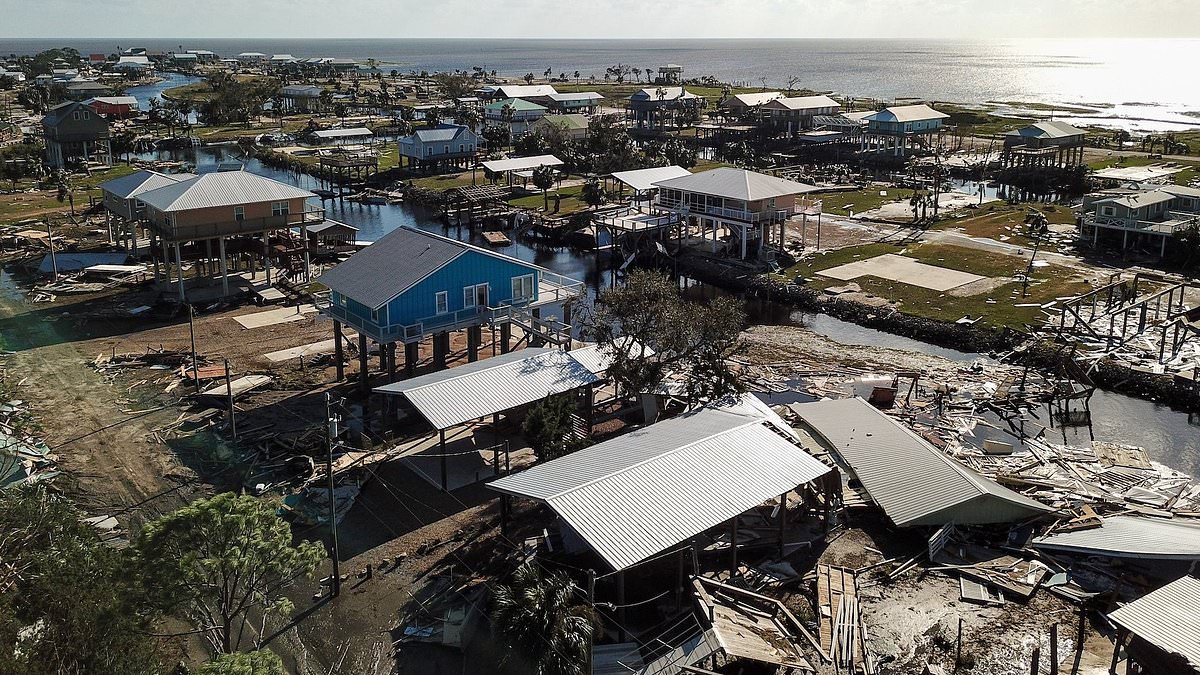A real estate expert is warning future homeowners of the ‘greatest crisis they will face’ in the wake of Hurricane Helene battering Florida and North Carolina.
Ryan Serhant, who is currently starring on Netflix’s Owning Manhattan, claims there is a emerging ‘cost of home insurance’ crisis due to the numerous natural disasters occurring across the country.
The seasoned professional explained that buyers are facing higher than ever insurance rates in states that are regularly being impacted by disasters – particularly those which tend to leave properties in shambles.
‘It’s about $34 billion of bad. It’s one of the greatest insurance crises that we’ll see, I think, in a very, very long time.
‘What’s more frightening to me is that only two to four percent of homeowners actually have flood insurance.

The seasoned professional explained that buyers are facing higher than ever insurance rates in states that are regularly being impacted by disasters – particularly those which tend to leave properties in shambles

Ryan Serhant , who is currently starring on Netflix ‘s Owning Manhattan claims that there is a emerging ‘cost of home insurance’ crisis due to the numerous natural disasters occurring across the country
‘If you get it through the National Flood Insurance Program, it’s $1,000 a year on top of all of your other costs. So it’s a travesty,’ he said on the talk show, Varney & Co.
According to recent data from insurance comparison platform Insurify, the typical annual premium will rise to $2,522 by the end of 2024 – a staggering increase of six percent from last year.
This projected increase for 2024 comes on the back of a 20 percent hike over the last two years.
This has largely been driven by escalating natural disasters, insurers pulling out of certain areas – which cuts down on competition – and higher fees for home repairs.

Debris lies on the ground in the River Arts District of Asheville, after a flash flood triggered by Hurricane Helene, in Asheville, North Carolina, October 3

The typical annual premium will rise to $2,522 by the end of 2024, according to predictions from insurance comparison platform Insurify

Hundreds of people are still missing and 780,000 homes were without power nearly a week after Helelne made landfall
Soaring costs mean home insurance is becoming increasingly unaffordable for many Americans – with some opting to forego coverage entirely as a result.
Homeowners in Florida already pay the highest premiums for coverage in the US, at an average of $10,996 a year in 2023.
But according to Insurify’s projections, this will increase a further 7 percent this year, hiking the typical premium in the state to a huge $11,759.
Meanwhile, those living in Louisiana currently face the second-highest home insurance rates in the country – at $6,354 annually – nearly three times the national average.

A flood damaged pottery tool business in the aftermath of Hurricane Helene on October 3, in Bat Cave, North Carolina

At least 200 people were killed in six states in the wake of the powerful hurricane which made landfall as a Category 4
Fox News Network Privacy Policy
Read More
'My cover is up 400%': Meet the Americans on the frontline of the country's home insurance crisis

Insurify predicts the state will see the greatest increase in premiums in 2024, rising 23 percent to an average of $7,809.
But many predict that rates may worsen due to the destruction caused by Hurricane Helene.
The death toll from the disaster has now surpassed 200 as rescuers continue to search for survivors from the storm – the deadliest since Katrina in 2005 which killed more than 1,800 people – that has battered the southeast.
Hundreds of people remain missing and 780,000 homes were without power nearly a week after Helene made landfall as a Category 4 last week as many continue to wonder whether more could have been done to sound the alarm on the huge storm before it struck.

Debris is strewn on the lake in the aftermath of Hurricane Helene, Wednesday, October 2, in Lake Lure

A mobile home and car along the Swannanoa River in the aftermath of catastrophic flooding caused by Tropical Storm Helene in Swannanoa, North Carolina, October 3
After coming ashore in Florida, Helene quickly moved through Georgia before soaking the Carolinas and Tennessee with torrential rain.
One small mountain town in North Carolina has been left in ruins – with locals describing the community of Swannanoa as ‘entirely erased’.
Over the weekend, estimates of the damage caused by the hurricane ranged from $15billion to more than $100bn.
